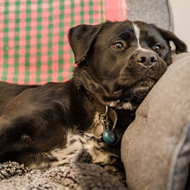
More than 18,000 people have signed an open letter.
Thousands of individuals have joined Dogs Trust in signing an open letter to the government to end “the lottery of finding pet-friendly accommodation in social housing”.
The letter, signed by over 18,800 people, calls on housing secretary Angela Rayner to extend the same rights to pet owners in social housing as those planned to be granted to renters in the private sector.
Announced in September, the new Renters' Rights BIll would give responsible pet owners in England’s private rental sector the right to request permission for keeping a pet, and prevent landlords from unreasonably denying such requests. However, the legislation does not currently extend to social housing tenants.
Dogs Trust, which has long campaigned for better housing options for pet owners, warns the new rights, though a step forward, would not address the shortage of pet-friendly rental properties. The charity is calling on the government to work with the private and social housing sectors to build confidence in renting to pet owners and ensure they are not disadvantaged when looking for suitable housing.
Dogs Trust chief executive Owen Sharp said: “Across the country, pet owners seeking social housing and those already in social housing who would like to get a pet face innumerable barriers, and even have to make the heartbreaking decision to give up their beloved family member to get a safe place to live. For some pet owners, their dogs represent the only family they have.
“While some social housing providers are already making fantastic strides in becoming pet-friendly, finding pet-friendly social housing remains a lottery.
“This must change. We need a baseline for all social housing providers, enshrined in legislation that allows all tenants to request a pet without that request being unreasonably refused by their landlord or social housing provider. We are pleased that an amendment on this has already been tabled in the House of Lords, and we hope that this will receive wide-ranging support.”
According to research by Dogs Trust and Cars Protection, 46 per cent of private landlords say they allow pets, yet 30 per cent of tenants report their agreements permit dogs. In over a third of these cases, landlords relied on generic advice or used standard templates, instead of considering individual circumstances.
Image (C) Dogs Trust.



 The Federation of Independent Veterinary Practices (FIVP) has announced a third season of its podcast, Practice Matters.
The Federation of Independent Veterinary Practices (FIVP) has announced a third season of its podcast, Practice Matters.